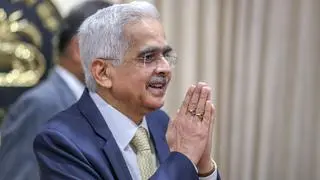The Reserve Bank of India (RBI) is expected to embark on a gradual normalisation of the reverse repo rate, hiking it by about 25 basis points at the upcoming monetary policy review, in the backdrop of the short-term market rates moving past the repo rate.
The Monetary Policy Committee (MPC), which will meet between February 7 and 9 amid India facing global headwinds in the form of global central banks turning hawkish and rising commodity, including crude oil prices, however, may choose to stand pat on both repo rate and the accommodative policy stance.
The reason is that concerns have emerged on the growth front in the face of the threat from the Omicron variant of Covid, and the likely inflationary impact of elevated crude oil and commodity prices.
“We forecast headline CPI inflation will rise to 6 per cent year-on-year in January, testing the upper bound of the RBI’s target range after staying within the range for six months. This will likely mark a near term peak, as headline inflation should moderate in the subsequent months,”said Rahul Bajoria, Chief Economist for India and the Antipodeans, Barclays Corporate & Investment Bank
“Overall, headline inflation will continue to stay close to the top end of the RBI’s target range, setting the stage for a gradual tightening of monetary policy in the coming months,” he added.
Bajoria expects RBI to begin normalizing policy at the upcoming MPC meet by increasing the reverse repo rate.
“While the decision from the upcoming MPC meeting is likely to be a close call, we expect the committee to keep the Repo rate on hold, but to narrow the policy rate corridor by undertaking a 20-25 basis points hike in the Reverse Repo rate,” Bajoria said.
Reverse repo rate is the interest rate Banks earn for parking surplus short-term funds with RBI. Currently, it is at 3.35 per cent.
Repo rate is the interest rate Banks pay to RBI for drawing funds from it to overcome short-term liquidity mismatches. Currently, The Repo rate is at 4 per cent.
The policy corridor between Repo rate and Reverse repo rate was widened from 25 basis points to 65 basis points in the March-April 2020 period.
This was done to make it relatively unattractive for banks to passively deposit funds with RBI and encourage them to use these funds for on-lending to productive sectors of the economy amid the pandemic.
Latest data
As per the latest data, industrial growth, based on the Index of Industrial Production (IIP), slipped to 1.4 per cent in November 2021, the lowest in the current fiscal, from 4 per cent in the previous month.
Retail inflation based on the Consumer Price Index (CPI) surged to a five-month high of 5.59 per cent in December 2021 against 4.91 per cent in the previous month.
“Elevated crude oil and commodity prices continue to add to India’s inflation concerns. It may be expected that the RBI will reprioritise and focus back on inflation,” said Jahnavi, Economist, Bank of Baroda.
“Excess liquidity in the system is another issue to contend. We expect RBI will hike reverse repo rate by 25 basis points and thus reduce the gap in policy corridor. Short term rates have also been inching towards Repo rate,”she added.
She expects no change in repo rate, while GDP forecast for FY22 is likely to revised lower.








Comments
Comments have to be in English, and in full sentences. They cannot be abusive or personal. Please abide by our community guidelines for posting your comments.
We have migrated to a new commenting platform. If you are already a registered user of TheHindu Businessline and logged in, you may continue to engage with our articles. If you do not have an account please register and login to post comments. Users can access their older comments by logging into their accounts on Vuukle.